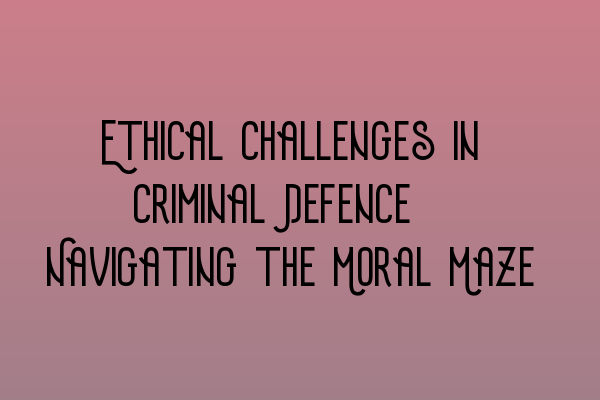Ethical Challenges in Criminal Defence: Navigating the Moral Maze
Criminal defence practitioners face numerous ethical challenges in their day-to-day work. As legal professionals, they must navigate a moral maze to uphold justice and protect their clients’ rights and interests. In this blog post, we will explore some of the main ethical dilemmas faced by criminal defence solicitors and how they can approach them.
The Duty to Zealously Defend
One of the key ethical challenges is balancing the duty to zealously defend a client’s interests while upholding the principles of justice. Criminal defence solicitors must advocate for their clients vigorously, ensuring their rights are protected at every stage of the legal process. This commitment to zealous defence sometimes encounters conflicts with their personal morals or societal expectations.
For example, defending a client accused of a heinous crime may put solicitors in a position where they have moral reservations about their client’s actions. Nevertheless, it is crucial for solicitors to separate their personal beliefs from their professional obligations. By doing so, they can ensure a fair and impartial legal process for their clients.
Ethical Obligations to the Court and Society
Besides serving their clients, criminal defence solicitors also have ethical obligations to the court and society as a whole. They must ensure that the legal system operates with integrity and that justice is served. This involves upholding the rule of law, presenting evidence truthfully, and adhering to professional conduct guidelines.
However, conflicts may arise when solicitors believe their client is guilty but lack sufficient evidence to prove it. In such cases, they must make difficult decisions about how to proceed ethically. They may choose to focus on procedural aspects of the case or work towards alternative resolutions.
Confidentiality and Privilege
Another key ethical challenge in criminal defence lies in the duty of confidentiality and legal privilege. Solicitors must maintain the confidentiality of their clients’ information, even if it conflicts with personal morals or societal expectations. This duty of confidentiality fosters trust between clients and solicitors, enabling open and honest communication.
However, there may be instances where solicitors become aware of their clients’ intentions to engage in illegal activities. Balancing their duty of confidentiality with the greater public interest becomes a moral dilemma. Despite the tensions, solicitors must remember that their primary duty is to their client, while still complying with their professional and ethical obligations.
The Importance of Ethical Decision-Making
To navigate the moral maze in criminal defence, solicitors should prioritize ethical decision-making. Engaging in ongoing professional development, such as taking SQE 1 Preparation Courses or SQE 2 Preparation Courses, can help enhance legal expertise and ethical competence.
By integrating ethical considerations into their practice, criminal defence solicitors can ensure that they uphold justice, protect their clients’ rights, and maintain the integrity of the legal system. Ethical dilemmas will undoubtedly arise, but by adhering to the principles of fairness, honesty, and professional conduct, solicitors can successfully navigate the complex world of criminal defence.
For more information on the SQE exams and legal professional development, be sure to check out these related articles:
- SQE 1 Practice Exam Questions
- SQE 1 Practice Mocks FLK1 FLK2
- SQE 2 Preparation Courses
- SQE 1 Preparation Courses
- SRA SQE Exam Dates
